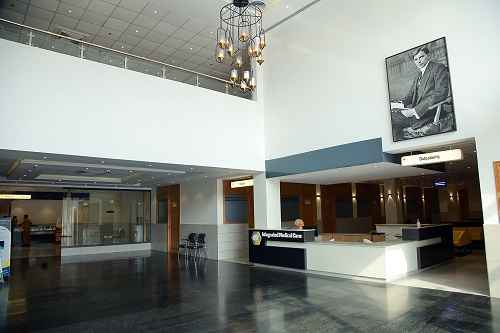- 09-May-23
Emphysema is a chronic obstructive pulmonary disease (COPD) that is known to affects the lungs' air sacs (alveoli). Emphysema reduces the lung surface area accessible for gas exchange by weakening and destroying the air sac walls. Breathing difficulties, coughing, and wheezing result from this.
Emphysema is most commonly caused by long-term exposure to cigarette smoke or other lung irritants such as air pollution or chemical fumes. Other risk factors for Emphysema include a history of frequent lung infections, a family history of lung disease, and a rare genetic disorder called Alpha-1 antitrypsin deficiency. Treatment for Emphysema typically involves medications to open up the airways, pulmonary rehabilitation exercises, and in severe cases; oxygen therapy or surgery to remove damaged lung tissue.
Emphysema Meaning in Urdu:
ایمفیزیما: ایک قسم کی کرونک ہنگامی پھیپھڑے کی بیماری ہے جو پھیپھڑوں کے خلیوں (ایلویولائی) میں نقصان کو شامل کرتی ہے۔ ایمفیزیما میں فضائی بالوں کے دیواروں کمزور اور توڑ جاتے ہیں ، جس سے پھیپھڑوں میں گیس تبادلے کے لئے دستیاب سطح میں کمی پیدا ہوتی ہے۔ اس سے سانس لینے میں تکلیف، گھتنے والی آواز اور کھانسی کا خاتمہ ناپائیدار ہوتا ہے۔ ایمفیزیما عام طور پر سگریٹ کی دھواں یا دوسرے دم دیتے سمیت ، ہوا آلودگی یا کیمیائی دھواں جیسے فضائی تنشی کے طوفانوں سے وابستہ ہوتی ہے۔
Emphysema Symptoms:
The symptoms of Emphysema can vary from person to person and they often develop gradually over time. Some common symptoms of Emphysema include:
- Shortness of breath especially during physical activity.
- Wheezing or a whistling sound when breathing.
- Chronic cough often with production of phlegm.
- Chest tightness or discomfort.
- Fatigue or lack of energy.
- Unintended weight loss.
- Bluish colour on the lips or under the nails.
Over time, these symptoms may get worse which makes it difficult to breathe even when at rest. If you suffer any of these symptoms or if you have a history of smoking or other lung irritants, you should consult a doctor very away. Early detection and management of the disease's symptoms can aid in symptom management and reduce its progression.
Emphysema Causes:
Emphysema is most commonly caused by long-term exposure to irritants that damage the lungs and airways. The most significant cause of Emphysema is cigarette smoking which accounts for 80-90% of all cases. Other causes of Emphysema may include:
- Exposure to air pollution such as car exhaust, industrial pollutants, or secondhand smoke.
- Occupational exposure to chemicals, dust, or fumes, such as coal dust, silica, or asbestos.
- Genetic factors or inherited deficiency of a protein called Alpha-1 antitrypsin which helps protect the lungs from damage.
- Age-related changes in the lungs that reduce their elasticity and ability to function properly.
These factors can cause inflammation and damage to the delicate tissues and air sacs in the lungs leading to the development of Emphysema. It's important to avoid exposure to these irritants and seek medical attention if you have symptoms of Emphysema or if you have a history of exposure to lung irritants.
Emphysema Treatment:
Emphysema has no known cure, however, treatment can help control symptoms, halt the disease's course and enhance quality of life. Emphysema treatment options could consist of:
- Medications: Bronchodilators and inhaled corticosteroids can help open the airways and reduce inflammation, making it easier to breathe. Antibiotics may also be prescribed to treat respiratory infections that can worsen Emphysema symptoms.
- Oxygen therapy: In advanced cases of Emphysema, supplemental oxygen may be needed to help maintain proper oxygen levels in the blood.
- Pulmonary rehabilitation: This is a comprehensive program that includes exercise, breathing techniques and education to help improve lung function and manage symptoms.
- Surgery: In severe cases, surgical treatments such as lung volume reduction surgery or lung transplantation may be considered.
- Quitting smoking: Stopping smoking is crucial in managing Emphysema as it can slow down the progression of the disease and reduce the risk of complications.
- Avoiding irritants: Avoiding exposure to lung irritants such as air pollution, dust, and chemical fumes can also help manage Emphysema symptoms and slow down the progression of the disease.
It's important to work closely with a healthcare provider to develop a personalized treatment plan for Emphysema as the severity of the disease and individual needs can vary.
When to See a Doctor:
It's important to see a doctor if you experience symptoms of Emphysema or if you have a history of exposure to lung irritants. Some symptoms to watch out for include shortness of breath, chronic cough, chest tightness, wheezing, fatigue, and unintended weight loss. If you have a history of smoking or exposure to air pollution, dust, or chemicals you may be at higher risk of developing Emphysema. If you experience sudden and severe shortness of breath or chest pain, seek emergency medical attention right away. These symptoms could indicate a life-threatening complication of Emphysema such as a collapsed lung or a heart attack.
Integrated Medical Care Hospital (IMC Hospital):
One of Pakistan's top hospitals is commonly mentioned as being the well-known IMC Hospital. The IMC Hospital now has access to a pool of senior, licensed, and experienced doctors who are all under one roof and have years of experience working in some of the most recognised and well-known medical facilities in the world. Visit the Integrated Medical Care Hospital (IMC Hospital) to schedule an appointment.

 Map
Map


.jpg)







